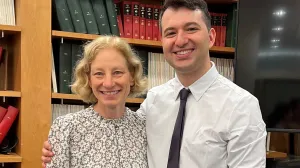By Darcie Fisher, Tufts Medical Center Correspondent
Spring may be approaching, but that pesky groundhog says we still have weeks of cold, New England weather to suffer through! We’ve all heard stories of people having heart issues while shoveling heavy, wet snow, but did you know the cold temperatures themselves can be to blame for heart issues? We spoke with Samantha Asber, MSN, RN, Clinical Nursing Director of Tufts Medical Center’s Cardiac Catheterization Lab to ask how.
What affects can cold temperatures have on your heart?
“Essentially, cold weather makes our bodies work harder – and that’s every single body – no matter your age or fitness level,” explained Asber. “Our bodies are working harder to keep us warm which means an increase in heart rate and blood pressure levels, making our heart in particular work harder and require more oxygen. For people who have certain risk factors, this additional work for the heart could lead to cardiac ischemia, a condition where the heart muscles do not get enough oxygen, and even to a heart attack.”
Who is at risk for having heart issues during the winter?
Asber says people with a history of heart disease, stents, high blood pressure, diabetes, smokers and those with family history of cardiac events should be particularly mindful. “People who are deconditioned and don’t get enough exercise are at risk of having heart issues while doing such things as shoveling snow,” said Asber. “For those people, even walking at a vigorous clip because they want to get out of the cold and wind can exacerbate or uncover these health problems because they’re not used to that level of exertion.”
What precautions should people take during winter months?
“Everyone should make sure to dress warmly and in layers,” said Asber. She also stresses the need to wear a hat and scarf since much body heat can escape through our head. “People with heart disease should avoid shoveling if at all possible, but if you must, then try to push the snow instead of lifting heavy, wet snow.” And even though we want to dress warmly, Asber says we have to find a balance, because being too warm can actually cause your heart vessels to open up when you overheat, and cause a quick, potentially dangerous, drop in blood pressure. “Listen to your body, and if anything seems off, just stop or slow down.” Avoiding alcohol prior to outdoor activities is also recommended since alcohol initially makes you feel warmer and can mask signs of strain on your body.
What signs + symptoms should people watch for?
“The most obvious sign of cardiac issues is chest pain, but there are certainly others that you should be aware of,” said Asber. “These include pressure or squeezing in the chest, shortness of breath and even pain or discomfort in the arms, back, neck, jaw or stomach,” Asber says women can often present with atypical symptoms, so they should be particularly mindful of all symptoms associated with heart attacks – not just chest pain.
The American Heart Association has more you can read on cardiovascular disease and the cold weather here.
Posted February 2021
The above content is provided for educational purposes by Tufts Medical Center. It is free for educational use. For information about your own health, contact your physician.

